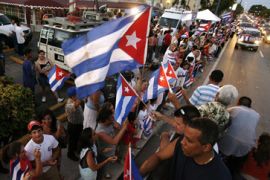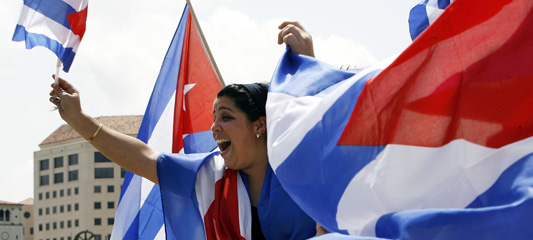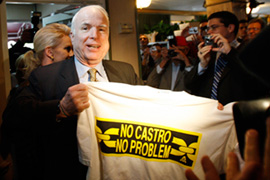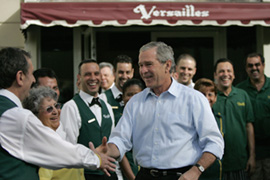Florida’s Latino factor
Hispanic voters crucial to the Republican presidential race.

 |
| Cuban Americans are an important political force in Florida [GALLO/GETTY] |
In Miami’s Little Havana the buildings opposite the Cafe Versailles, where Cuban exiles gather to drink coffee, are covered with posters of Rudy Giuliani, the former New York mayor who is running for the Republican party presidential nomination.
|
Your Views |
|
“If Obama becomes president, there would certainly be impact all over the globe” balkrishnajha, Kathmandu, Nepal |
Giuliani’s rivals, Senator John McCain and Mike Huckabee, the former governor of Arkansas, have also paid visits to the cafe to pay their respects to Florida’s Cuban-American community – and of course to seek their votes.
Florida is home to a large and extremely influential Latin community, the majority from Cuba and Puerto Rico, although in recent years large numbers of Colombians, Venezuelans and Central Americans have also migrated here.
About 20 per cent of Florida’s population is Latino, and in Miami, the figure is close to 33 per cent.
Florida is also one of the largest states in the US, accounting for 57 of the delegates who will vote at the Republican party’s nominating convention, making the importance of capturing the Latino vote there obvious.
‘Bloody dictator’
The majority of the Cubans who came to Florida in the immediate years following Cuba’s 1959 revolution are now US citizens and are therefore eligible to vote.
Many of them are staunch conservatives who are expected to support the Republicans.
 |
| John McCain has been endorsed by Florida’s Cuban-American senator [Reuters] |
There are about 500,000 registered Latino Republicans who expect their party’s nominee to maintain the 45-year economic and political US embargo against the Cuban government.
As expected, every single one of the Republican candidates running this year is vowing to do just that.
“Fidel Castro is a bloody dictator and I will not negotiate with Cuba until the Castro brothers are out,” Rudy Giuliani said at a gathering of elderly Cubans in Little Havana late last week.
McCain scored an important advantage over his rivals by obtaining the endorsement of Florida’s Cuban-American senator, Mel Martinez.
With Cuban-Americans accounting for one in 10 of Republican votes, that could give McCain the edge in a tight race for the party’s presidential nomination.
Younger Generation
But not all Cuban migrants support a hardline, anti Castro policy.
The younger they are, the more they favour a more flexible stance towards Cuba, especially an easing of the rigid travel restrictions imposed by the Bush administration.
| In focus |
The regulations allow Cuban Americans to visit the island only once every three years and also restrict the amount of money that expatriates can send to their relatives back home.
“I moved here 10 years ago and left all my family behind. Why shouldn’t I be able to help and visit my mother, who is old, and my sisters and brothers?” complains Ricardo Martinez, a television technician.
Martinez is typical of those who hold the more pragmatic, less ideological attitude of younger Cuban migrants who arrived in the last 10 to 20 years.
They are not committed to either the Democrats or the Republicans.
The majority, however, have also not yet opted to take US citizenship and therefore cannot weigh in on elections.
Thus, the older and wealthier Cuban exile community still has a disproportionately large influence on Florida politics.
Few forget that George Bush, the current president, was elected in 2000 thanks to Florida, which he won by only 537 votes that came partly from Miami, where the Cuban vote is the strongest.
Immigration issue
But this is a scenario unlikely to repeat itself.
Puerto Ricans are voting in larger numbers and in the 2006 congressional elections, more Florida Latinos voted for the Democrats than for the Republicans.
 |
| Miami was crucial to George Bush’s 2000 election win [EPA] |
A key issue that unites the Latinos in Florida with those around the US is immigration.
With all but one of the Republican candidates promising to crack down on illegal immigrants and those who employ them, there could be an important shift towards the Democrats, who are less conservative on the issue.
“This country was made up of immigrants. I don’t agree that they should be hunted down and thrown out like dogs,” says Raquel Diaz, whose parents came here as illegal immigrants from Nicaragua in the early 1980s.
Perhaps because of their negative experiences in their home countries, in the past a great many Latin Americans who settled in Florida have shown apathy, if not disdain, for politics.
“Politics and politicians are alike everywhere in the world. I’ve never voted here in my life,” says Alfredo Menezes, a taxi driver who moved to Miami from Chile in 1972.
But that is an attitude that is changing, too, as more Latinos realise that they are now the largest minority group in the United States, where their opinions – and votes – can make a difference.
Lucia Newman is Al Jazeera’s Latin America editor.
